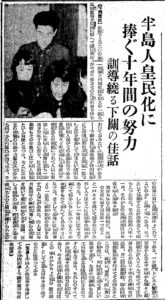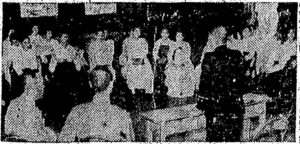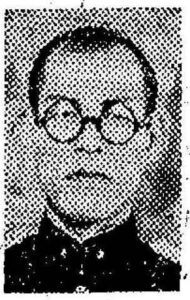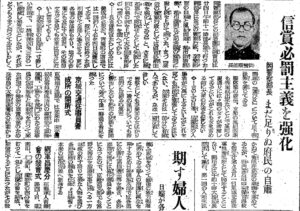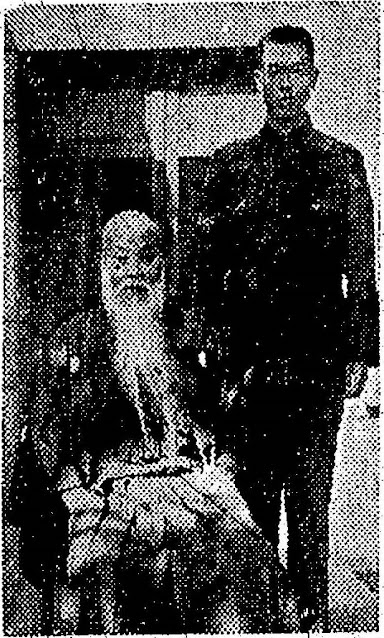The following propaganda article profiles one Japanese teacher in Shimonoseki who took it upon himself to organize Korean residents into neighborhood associations (Tonarigumi) to continue the indoctrination and brainwashing into the Imperial Way that they were undergoing under the Patriotic Groups (JP: aikoku-han, KR: aeguk-ban, 愛國班) in Korea.
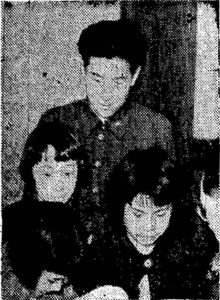 |
| Teacher Yoshioka with his Korean students |
The neighborhood associations (Tonarigumi) in mainland Japan and the Patriotic Groups in Korea were similar, in that both were responsible for allocating rationed goods, fire fighting, public health, snitching on 'ideological criminals', and civil defense, but the latter was more focused on Imperializing the Koreans into true Japanese people. As we see in this article, the Tonarigumi for Koreans were modeled after Patriotic Groups to focus on enforcing State Shinto worship, improving Japanese language skills, and instilling Imperial Japanese patriotism.
Shimonoseki, a port city in Kyushu, Japan which served as a gateway to Korea, had segregated Korean neighborhoods during the colonial period. Major companies, such as construction, mining, and logistics firms, hired Korean workers to do the most undesirable work, back-breaking work lifting heavy loads. There was forced recruitment of Korean workers directly from Korea, especially for sensitive military projects, like the Kanmon Tunnel, fortresses, and airports, since the long-term Korean residents of Shimonoseki were considered to be unreliable. Korean workers lived in substandard company housing without running water in undesirable areas, such as in areas close to pig manure lagoons. The Korean neighborhoods were organized into Kyōwa-kai, which were neighborhood associations under police control. The Japanese police put the bosses of the housing complexes and brothels in charge of the Kyōwa-kai, and these collaborator bosses reported directly to the Special Higher Police, which established a heavy presence in these Korean neighborhoods through police booths and brutal detention centers. The collaborator bosses acted like the mafia and treated the residents like slaves, especially if they were escapees from forced labor camps elsewhere in mainland Japan.
[The above information comes from the first-hand accounts of a first-generation Zainichi Korean resident of Shimonoseki, Gang Hae-su (강해수/姜海洙) whose testimony given in 2002 is published in Japanese in Chosyu-Journal, an anti-militarist, pro-worker newspaper in Japan.]
(Translation)
Gyeongseong Ilbo (Keijo Nippo) February 27, 1943
Ten Years of Efforts Dedicated to the Imperialization of the Koreans
A beautiful story from Shimonoseki about a teacher
[Shimonoseki telephone report] A moving, beautiful story is told about an elementary school teacher and a group of Koreans living in mainland Japan who are looking forward to the day of honor that is about to come, just before the joyous implementation of wartime conscription.
The main subject of the story is Mr. Ken'ichi Yoshioka (35), a teacher at Enoura National School in Deshimatsu town, Hikoshima district, Shimonoseki city, and the Koreans living in the same town who have always admired him. The population of Hikoshima district has increased rapidly over the past decade with the establishment of factories and the frequent arrival and departure of ships. In particular, the dramatic increase in the number of Korean residents has led to the sudden formation of a settlement, and more than half of the children at Enoura National School are Koreans.
Here, differences in customs and inadequate language skills have caused some misunderstandings. Every time this happened, the young teacher Yoshioka pondered deeply, "Are things really alright this way?" It was November 1933 when he decided to take action, not content with just standing by and doing nothing. From then on, Yoshioka visited the Korean settlement day and night. Going door to door, he told them, "You Koreans and we Japanese are brothers, so dedicating yourselves to the Imperial nation is the only way!"
But there were initially many difficulties, and the Koreans hated him and refused to engage with him. However, by the end of the first year, the Koreans began to welcome him with respect. In this way, the Kōjō-kai was established in the settlement to provide neighborhood support, ahead of the establishment of the Kyōwa-kai. The Kōjō-kai holds regular meetings several times a month, similar to today's neighborhood association (Tonarigumi) meetings, to emphasize respect for the gods and the ancestors, to improve Japanese language skills, to encourage frugality and work ethic, and to produce good citizens.
In the meantime, when the digging work for the Kanmon Tunnel began, industrial warriors arrived one after another from the Korean peninsula. The small settlement became a larger town, and ten neighborhood associations were formed. Twice a month, there was vocational training in resource conservation and waste collection. They performed heartfelt activities including war donations and contributions, comfort visits to frontline soldiers, and mutual savings bonds. They have also formed neighborhood associations for the children, and they are striving to become worthy Imperial subjects. All of this is the result of 10 years of efforts under Yoshioka's guidance. Now he and all the members of the neighborhood associations are determined to send out splendid young men from the neighborhood associations as "humble shields protecting His Majesty the Emperor". [Photo: Yoshioka instructing Korean children at a regular meeting = censored by Shimonoseki Fortress Command Center]
Source: https://www.archive.org/details/kjnp-1943-02-27
(Transcription)
京城日報 1943年2月27日
半島人皇民化に捧ぐ十年間の努力
訓導繞る下関の佳話
【下関電話】決戦下よろこびの徴兵制実施を目前に控えて国民学校一訓導と内地在住半島人の一団とがやがて来るその光栄の日を待ちわびているという感激美談がある。
下関市彦島地区弟子待町居住、江之浦国民学校訓導吉岡憲一氏(三五)と氏を敬慕して已まない同町在住半島人達がその話題の主である。彦島は僅々十年急激に工場設置や船舶出入りの頻繁につれて人口も増加し、殊に半島人の激増は忽ち一部落を形成するに至り、江之浦国民学校もその半数以上は半島人児童という有様となった。
そこにはお互いの習慣の相違や言葉の不充分から何やかの行き違いが出て来る。その度毎に若い吉岡訓導は”これでよいのか”と深く考え込み、じっとして見逃すことが出来なくて起ち上ったのだ。それは昭和八年十一月。それからの吉岡訓導は日毎夜半島人部落を歴訪:「君達も俺達と同じ同胞だ。皇国の為に尽くす道は唯一つだよ」と一戸一戸を説いて廻るのだった。
然し人々はそこには幾多の困難があった。しかし一年目には今まで嫌って相手にもしなかった人々が尊敬をもって迎えてくれるようになった。そうして部落には協和会より一足先に隣保扶助の役割をなす『向上会』が出来た。向上会は毎月数回今の隣組常会に変わらぬ常会を開いて敬神崇祖の念を強調、正しき国語の熟達、貯蓄皆労と善き国民たらむと精進が続けられたのである。
一方、関門トンネル鑿掘工事着手となるや半島から続々と産業戦士が入りこんで来て、今では部落も町とかわり十組合の隣組合が出来、月二回資源愛護、廃品回収授産実習等を行って、その得たるところは、献納に、寄付に、前線勇士の慰問に、共同貯蓄と涙ぐましい活動を続け、なお子供隣組も出来て只管立派な皇国臣民になるのですと励んでいる。それらのすべてが吉岡訓導十年間の努力の結果であり、今その訓導と隣組合全員は、この組合からも”大君の醜の御楯”として立派な青年を送り出すのだと張切っている。【写真=半島人子供常会を指導している吉岡訓導=下関要塞司令部検閲済み】
